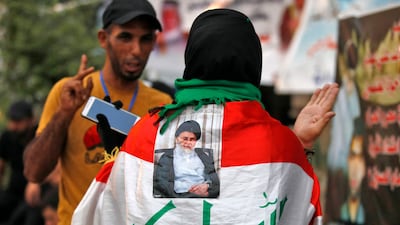Iraq’s powerful cleric Moqtada Al Sadr is demanding a rewrite of the constitution, abolishing the quota system and demanding that foreign powers leave the country in order for deadlock to ease, a close aide told The National.
Baghdad's heavily fortified Green Zone was stormed by Mr Al Sadr's supporters last month who occupied the parliament building and staged an ongoing sit-in protest. They are demanding an overhaul of the political system and to oust the country's elites, whom they believe are corrupt.
The sit-in has made it impossible for politicians to convene and proceed with the formation of a new government following elections last October.
“According to Sayed Moqtada Al Sadr (and those close to him) this is going to be the last chance for political players in Iraq as they need to urgently address the problems and all the mistakes they have committed so far since 2003,” Dhiaa Al Asadi, an Iraqi academic and former top politician in Mr Al Sadr's political movement told The National.
Mr Al Asadi, who is now on leave but acted as a political adviser to the powerful cleric, said politicians need to address the expectations of the public, a top demand of Mr Al Sadr.
"Sayed Al Sadr has always said he wants a prosperous, powerful and stable Iraq, these are general objectives but the detailed objectives must be drafted by specialists," he said.
Since the US-led invasion that toppled former dictator Saddam Hussein, abuse of public funds has become part of the political culture in the war-torn country.
It has slowed the process of rebuilding, impacted good governance and the provision of public services.
Corruption is rife in Iraq and several ministers have been arrested or removed from office over the years, accused of stealing or misusing funds from the defence, electricity and trade ministries.
"We need a stable Iraq, inside and out to create a stable environment inside and around us," he said.
For Mr Al Sadr, it was clear that "neither the government that was formed post 2003, nor the others can address the country's challenges."
Mr Al Sadr's political movement has controlled various ministries in the past including the health and water ministries, as well as having loyalists at the helm of the planning ministry and the ministry of public works in previous governments.
The populist cleric still has supporters in senior government positions within key ministries — alongside loyalists to the main post 2003 political parties, as well as loyalists within the foreign ministry.
As a result, the movement's political opponents have levelled corruption accusations against the group. However, supporters of the cleric see him as a champion of the anti-corruption fight.
Political deadlock
Since 2003, Mr Al Sadr has fought to end US and most recently Iranian influence over Iraq’s internal politics.
His political bloc won the plurality of seats in Parliament during October’s national elections, but still far short of a majority. It put them in pole position to form a government.
However, bitter political rivalries have made it impossible for parties to agree on forming a new government.
Mr Al Sadr’s rivals, the mostly Iran-backed Co-ordination Framework, have put forth the candidacy of Mohammed Al Sudani for prime minister.
But the cleric and his supporters have strongly opposed the nomination as they believe Mr Al Sudani is too close to former prime minister Nouri Al Maliki, a long-term rival of Mr Al Sadr widely blamed for presiding over successive corrupt governments.
Mr Al Asadi, who led the Sadrist-linked Al Ahrar bloc in parliament, said the cleric "believes those people have occupied government positions and we have not seen any good come out of it."
"He is a firm believer in the capability of specialists to lead the country and that was the main reason why he’s objected to the people presented by the framework," he said.
"We need to see changes on the ground because Iraqi people are not going to tolerate or accept new failures and without planning and drawing policies we cannot go further."
Instead, Mr Al Sadr has been calling for the dissolving of the parliament and for early elections.
“These are very easy demands to implement by the government and political parties if they are serious about reforms and changes,” Mr Al Asadi said.
Understanding Sadr's mindset
Mr Al Sadr has been listening to different sides of Iraq's various opposition groups, Mr Al Asadi says, including Iraq's small Communist party and groups linked to the protest movement known as the Tishreen, or "October" movement, named after widespread protests that erupted in October 2019, which were met with a vicious government crackdown, killing hundreds.
The populist cleric is close to those on the streets as he is "open to all ideas and that’s why when he talks he’s very close to people," Mr Al Asadi says.
Mr Al Sadr is not just "listening to his close circle, he is also listening to academics and those that are affiliated to other political backgrounds such as the communists and others".
"They say they have been contacted by people close to Mr Al Sadr so he is trying to do his best."
One of the political elite's main problems is that they are detached from the public, he said.
“They don’t know how people think, their traditions, especially those living in the outskirts of the cities, how they live, how the tribes interact with one another, they are fully detached," Mr Al Asadi said.
"They are just living in the Green Zone.
"Some of them have their prestige and high living standards and they can’t feel or understand how people think right now."













